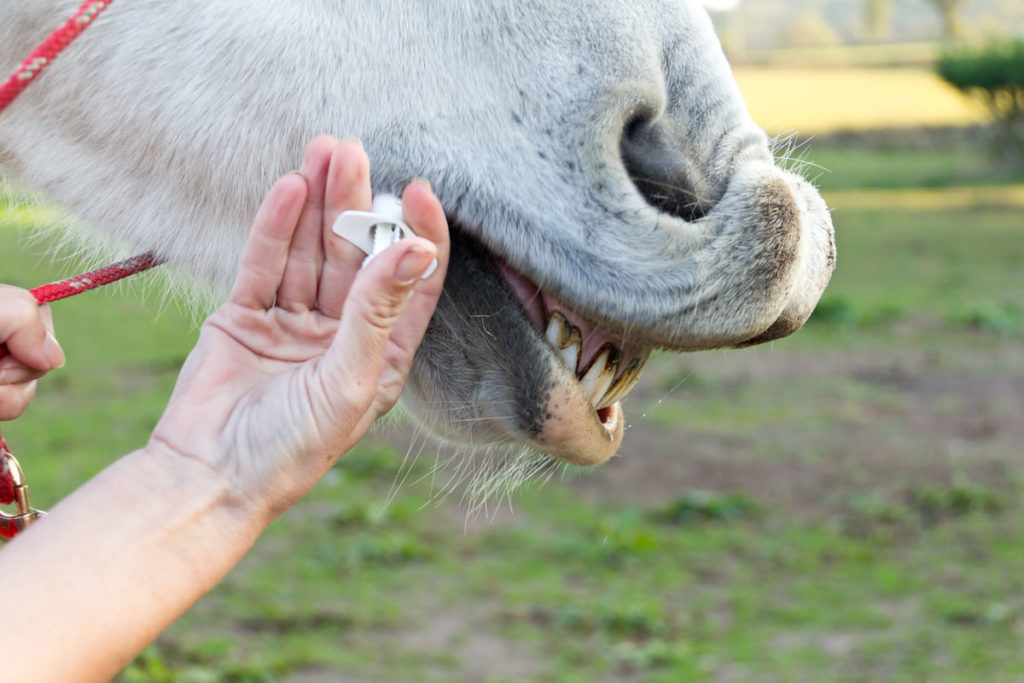
When horses are managed for gastric ulcers using omeprazole, it is not uncommon for the dose to be tapered off toward the end of treatment. Rebound gastric hyperacidity (RGH) after discontinuation of omeprazole, as a consequence of hypergastrinemia, might contribute to recurrence of equine squamous gastric disease within days to weeks of medication withdrawal. A study looked at changes in serum gastrin and chromogranin A (CgA) when omeprazole treatment is stopped [Blark, B.; Steel, C.; Vokes, J. et a. Evaluation of the effects of medium-term (57-day) omeprazole administration and of omeprazole discontinuation on serum gastrin and serum chromogranin A concentrations in the horse. Journal of Veterinary Internal Medicine June 2023; DOI: 10.1111/vim.16795].
The study included 14 retired Thoroughbred racehorses aged 8 – 14 years that were still active for jockey training. Gastroscopic exam occurred on days 0, 28, 31, 59 and 62. Diet was held steady with timothy and alfalfa hay, commercial complete feed and rice bran. Omeprazole was administered once daily from days 1 – 61 at the dose of 4.4 – 5.3 mg/kg, which is double the recommended dose to suppress gastric acid secretion to treat equine squamous gastric disease. Treatment was given 30 minutes prior to the horses being fed. Throughout the study, horses were subjected to two bouts of two days of recommended withholding periods, so treatment totaled 57 days.
How Omeprazole Works
Gastrin (hormone) stimulates acid production, but as stomach acidity increases, gastrin is inhibited. Elevation of gastric pH then stimulates gastrin and more acid production. Omeprazole—a proton pump inhibitor—causes an increase in gastrin within five days of starting treatment, and this levels out by seven days. However, it is a drug that interferes with the feedback loop between gastrin and gastric pH to ultimately suppress acid production.
What Happens when Omeprazole is Withdrawn?
When omeprazole administration is withdrawn, the high levels of gastrin—reportedly doubling within one to two weeks—once again stimulate acid production to result in rebound gastric hyperacidity (RGH). Once omeprazole treatment stops, there are reports that ESGD recurs in 83% of horses within three days as gastrin returns to pre-treatment baseline levels within just a couple of days.
Other cells—enterochromaffin-like cells or ECL—are also stimulated with high gastrin levels, and they further signal the stomach to produce gastric acid. Chromogranin A (CgA) is used to evaluated ECL cell density in this study. During treatment and once treatment was discontinued, there was no change in CgA, i.e. ECL cell density, so the authors concluded that it is likely that ECL signaling does not contribute to RGH.
Study Findings
The practice of tapering omeprazole as treatment ends is costly and might be unnecessary. The authors summarized: “Our findings do not support the use of tapering periods after medium-duration omeprazole treatment in the horse. Instead, management practices targeted at decreasing ESGD risk, such as rest or decreased exercise and increased roughage intake, ideally including alfalfa hay, should be optimized in the 2 to 4 days after discontinuation of omeprazole.” In addition, it is important to limit the use of non-steroidal anti-inflammatory drugs (NSAIDs), which are implicated in inciting gastric ulcer disease.








